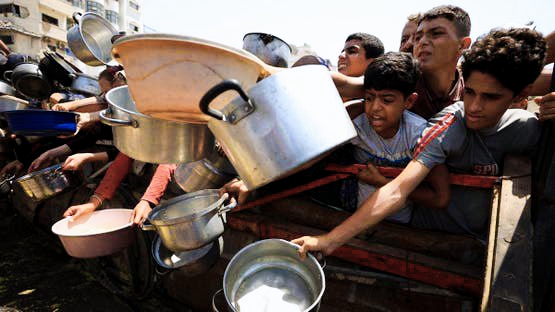Amnesty International accused Israel, in a report released today, Monday, August 18, of following a systematic and deliberate policy of starvation against the residents of the Gaza Strip, at a time when the United Nations and humanitarian organizations warn that the Palestinian territory is rapidly approaching a catastrophic famine.
According to the report, which was based on interviews with 19 Palestinian displaced persons and two medical staff treating children suffering from malnutrition, "Israel is carrying out a deliberate starvation campaign in the occupied Gaza Strip, through the systematic destruction of the health infrastructure, safety, and the social fabric of Palestinian life."
The organization viewed that what is happening in Gaza "is not an incidental or unfortunate result of military operations, but a deliberate outcome of studied Israeli plans and policies implemented over the past 22 months, aimed at imposing living conditions that lead to the physical destruction of the Palestinian population," considering that this falls within the context of what it described as "ongoing genocide" against the residents of Gaza.
The organization had accused Israel in April of committing "live genocide" amid the ongoing war since October 7, 2023, between the Israeli army and Hamas.
In contrast, the Israeli Foreign Ministry denied these accusations, describing them as "false and completely unfounded," while the "Cogat" authority - which is the Israeli body overseeing civil affairs in the Palestinian territories and is affiliated with the Ministry of Defense - denied the existence of any indicators of widespread malnutrition in the sector, accusing Hamas of "promoting a narrative of famine."
* Shocking numbers of victims .. and children at the heart of the crisis
According to the Gaza Health Ministry, affiliated with Hamas, 227 people have died of starvation during the 22 months of war, including 103 children.
The World Health Organization also announced the death of 148 people due to malnutrition in the sector since January 2025.
For its part, the World Food Programme of the United Nations warned, in a report released this month, that hunger and malnutrition in Gaza have reached their highest levels since the beginning of the war, clarifying that:
• More than a third of the population of the sector has not eaten for consecutive days.
• About 300,000 children are at risk of acute malnutrition.
• The situation is worsening due to the prevention of humanitarian aid trucks from entering.
* A suffocating siege and "selective" aid distribution
Since the attack launched by Hamas on southern Israel on October 7, 2023, Israel has imposed a tight siege on the Gaza Strip, tightening it further on March 2, 2025, by preventing any humanitarian aid or commercial goods from entering, deepening the humanitarian crisis in the besieged coastal sector.
In late May, Israel allowed limited quantities of food supplies to enter, which were distributed by the "Gaza Humanitarian" organization - an entity funded by Israel and the United States - amid refusal from UN agencies to cooperate with this organization, increasing the ambiguity and controversy surrounding the transparency and effectiveness of aid distribution.
* Plans for field control .. and fears of greater escalation
In a related field context, press reports revealed details of an Israeli plan to control Gaza, including launching a major military operation on October 7, with the participation of four military divisions, in a clear indication that the situation is likely to escalate further, amid the worsening humanitarian catastrophe and the lack of a political horizon for a solution.

